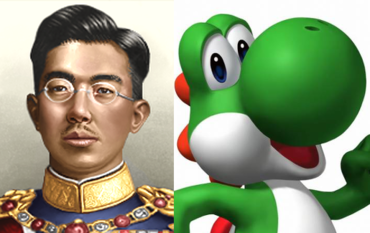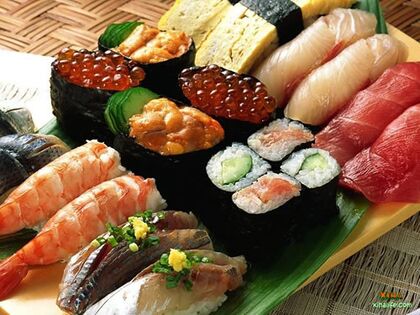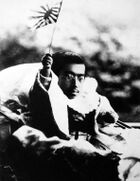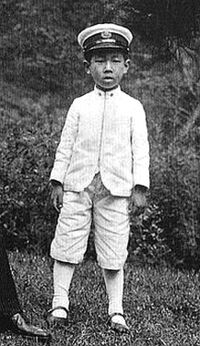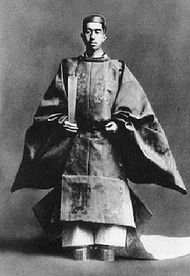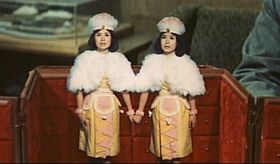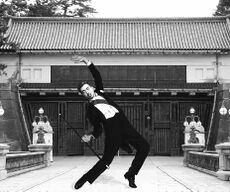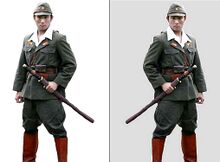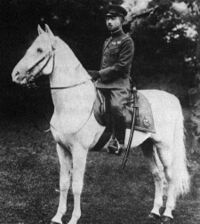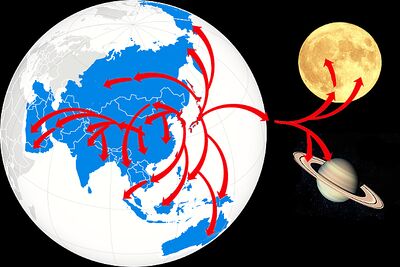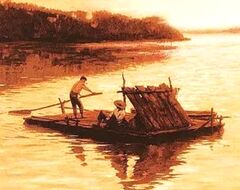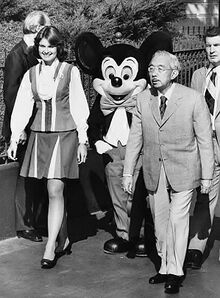Hirohito
Hirohito (裕仁, 29 April 1901 – 7 January 1989) was the 124th Emperor of Japan, reigning from 25 December 1926 until his death. He was descended directly from gods according to the Shinto religion and was therefore a god himself, except to his wife and everyone outside of Japan. However, he was still highly enough regarded to qualify for free extra pizza toppings anywhere (limit five).
In Japan, he is now referred to primarily by his grave imprint Emperor Shōwa (昭和天皇). Shōwa (昭和) is the name of of the era corresponding to the emperor's reign, and was made the Emperor's own name upon his death in attempt to displace any war crimes or bad karma. This was considered one of the biggest "nice try"s of the 20th century.
Origins[edit]
Hirohito's father, Crown Prince Yoshihito and future Emperor Taishō, was physically and mentally challenged from birth and not only for his unwillingness to kill any Chinese or Koreans who happened to be in the same room with him. However, the combination proved to be unbearable to the military and to members of the royal court. The latter left porn lying conspicuously around the palace as a hint to get down to it and produce an heir whom they could make into a willing puppet.
Court members were pleased when they heard the crown prince praying to his ancestor gods for "his heart's desire", which they assumed could only be a male heir. This was also heard by shape-shifting foxes sent as spies to the palace, who decided to help make his wish come true as they were loyal Japanese, too.[1] The foxes instructed a dragon to eat molten lava from each of three of Japan's erupting volcanoes and built a nest for it on the roof of the royal palace. Soon, the dragon laid a giant Kinder egg which was placed in the throne room on 29 April 1901.[2] Prince Yoshihito awoke and found the egg just as it was about to hatch. Overjoyed, he beheld his wish-come-true: a pony. As he rushed off with the animal,[3] he failed to notice the little baby left behind in the foil wrap remnants. This was Hirohito, with his signature wire-frame glasses, divinely created as predicted in the sacred texts.[4] The baby was given the title Prince Michi and taken by retired rear-admiral Kawamura Sumiyoshi for his first bath with toy battleships and rigorous imperial baby toilet training.
[edit]
On 27 May 1905 four-year-old Hirohito was being given a boat ride aboard the Imperial Japanese Navy battleship Asahi in the Sea of Japan. He was having a grand time shooting fish with the warship's twelve-inch guns when a report from the fleet flagship Mikasa[5] was received. The Russian enemy fleet was sighted and the fleet was to assemble into a battle line. Sitting on the shoulders of Captain Nomoto Tsunaakira, Hirohito began barking out orders. However, the young prince only spoke a court version of Japanese and mumbled besides, so was not well understood by the crew. Nomoto had to translate the best he could, still deferring to the high rank of his guest. Asahi fell into the battle line led by the flagship Mikasa. In the classic "crossing the T" formation, Asahi's inspired gunners fired nearly 150 rounds with its big guns, and sank or damaged eight ships, mostly Russian. The officers on board were impressed by Hirohito's coolness in battle, as he had a sliced banana snack on the bridge and took a nap as the battle was winding down.
1908 to 1920[edit]
Hirohito then went on to the quiet life of a student at the Peers School with the children of high-ranking government officials. After transforming several children and a teacher into toads, he was sent to private schooling by himself. There he graduated at the top of his class in 1921, as was expected.[6]
In the meantime, his father Yoshihito assumed the throne upon the death of the Meiji Emperor in 1912. This made Hirohito the Crown Prince and heir apparent.[7] As such, one of his official duties was to be sent to Europe to study their military equipment. In reality, he was sent to spy and report on modern flush toilet technology.
Regency and ascension to the throne[edit]
As Emperor Yoshihito was constantly ill, Hirohito became regent in November 1921, immediately attracting the attention of various assassins. A supposed Communist attempted to shoot Hirohito but was foiled by a sacred phoenix that flew in from nowhere and took the bullet intended for the young emperor. A hand grenade thrown at Hirohito was grabbed and swallowed by a totoro who suffered no serious injuries from the resultant explosion. Several Koreans were accused of plotting against Hirohito and were executed, but instead of killing all Korean residents in Japan and Korea, government officials showed subtle cruelty by making the consumption of kimchi illegal.[8] A bomb planted in the royal palace was removed by sacred armadillos, animals thought only to live in the US.
Despite abundant supernatural help, Hirohito bought all the lucky charms he could get his hands on and surrounded himself with fanatical defenders from the army. Daily, the emperor would practice shooting lightning from his fingertips.[9] He would also practice folding the universe into an n-dimensional polygon to confuse attackers. Also daily, he would receive a report on the number of his bodyguards still left alive, since they would kill each other for not being fanatical enough.
The Great Kantō earthquake[edit]
An earthquake of magnitude 7.9 struck the region around greater Tokyo on 1 September 1923. This caused massive devastation and the loss of up to 140,000 lives. Even more damage was caused by resultant tsunamis. Hirohito and his family were on a holiday in Nikko, far from the imperial palace in Tokyo.[10] Rushing back to see if there was still life in Tokyo, the emperor worried that he would be blamed for not using his supernatural powers to protect the people. On the contrary, the people of the Kantō region thought they had somehow incurred the wrath of Hirohito and were fearful of his arrival. In every city he visited, he was greeted by piles of neatly wrapped gifts and obsequious bowing residents, including dead ones.
At one point, Hirohito remarked, "I could go for some Korean (food) right now." Misunderstood because of his use of the obscure court dialect again, the military and the populace went on a rampage, killing thousands of Koreans. A later coverup explained the carnage by stating that Koreans were looting their own stores and homes and were shot or shot themselves by accident.
Marriage[edit]
Hirohito married a distant cousin, Nagako, on 26 January 1924. While royal, she was not considered godlike and was therefore required to walk five steps behind the emperor and wear the Paper Bag of Shame until she was able to produce an heir. That she did, plus a spare, plus five daughters who were considered to be of little use. The latter were constantly being stuffed into boxes by palace staff and sent to random addresses around the world. Most of them managed to make it back to Tokyo eventually, for reasons only known to themselves.[11]
Enthronement[edit]
On 25 December 1926 Hirohito assumed the imperial throne following his father's death. This was marked by an elaborate and arcane series of rites. So much so that at one point, a confused Shinto priest had Hirohito and one of his brothers jump over a broomstick three times. This meant that they were now married. A hasty trip to Las Vegas solved the problem and the ceremonies continued. The most important one was the presentation of the Three Sacred Treasures: an ancient sword, an ancient mirror and a sacred jewel, each marked "Made in Japan". These symbolized the legitimacy of Hirohito as emperor.[12]
Early reign[edit]
At the start of his reign, Japan was already one of the Great Powers, with an excellent economy and the third-largest navy,[13]) and one of the four permanent members of the League of Nations after the joint seal clubbing of Germany. Japan was indeed an empire, holding all of Korea, parts of China and many Pacific islands even though most of the empire consisted of ocean and fishes.
At this time, the country was politically charged, with assassinations of political figures and dissidents becoming the norm. Now with very few surviving cabinet members to consult, Hirohito turned to friends and associates for help. One was Mothra, who lived in the rafters of the royal palace. The emperor was introduced to Mothra's close friends, two tiny fairy twins who spoke in unison and sung pop tunes of the day. Their advice and music choices proved to be convincing and Hirohito soon ignored all other advisors, as they would probably be dead soon, anyway. Little did the emperor know that the fairy twins were agents of General Hideki Tojo, who was bent on exterminating anything not Japanese.[14] After that, he planned to kill every Japanese civilian and lastly, the hated Mandarin Duck.
The Mukden Incident[edit]
Egged on by the fairy twins, Hirohito got caught up in war fervor against everyone, everywhere. After the assassination of Manchurian warlord Zhang Zuolin (Wade-Giles: Chang Tso-lin) by a bomb placed on railroad tracks, colonels in the Japanese Kwangtung army wanted to repeat bomb the Japanese-controlled South Manchuria Railway. The blame would be put on nearby Chinese troops and Japanese troops would sweep in to "protect" the railroad and take over Manchuria (now North China). When word of this reached Hirohito, he called in the officers and offered the Sacred M-80 Firecracker of Kamakura for the job. The awed colonels planted this on a section of track near Mukden (now Shenyang) on 18 September 1931, with Japanese railway personnel and army guards sent hundreds of miles away to be safe. However, due to improper storage, the Sacred M-80 failed to even scratch the rail it was placed under.[15] Nonetheless, the colonels assembled as many troops as they could to shout "BOOM!" and initiated the conquest of Manchuria with little resistance.
The ruse was exposed by the Bulwer-Lytton report in 1932: "It was a dark and stormy night. Suddenly, a shot rang out. The maid screamed. Manchuria was taken over by the Kwangtung Army."[16] Japan was thrown out the League of Nations for "not doctoring the photos of railway damage" and for "not using a better excuse for military intervention like a good White European would". But Japan now held a large chunk of Asian real estate albeit right under the nose[17] of Russia. In the 1960s Hirohito would tell people he was under the impression that the Sacred M-80 was to be used in an episode of The Addams Family for blowing up Gomez's model trains. This does not explain the fact that the emperor was seen tap dancing around the imperial palace when news of the fall of Manchuria was reported on the radio.
Purple reign[edit]
February 26 Incident[edit]
In 1936 a group of fanatical army officers, called the Kōdō-ha, planned a coup d'etat to return absolute power to the God Emperor Hirohito. This would include the powers of radioactive breath and control of earthquakes, both to be used against China. They were disgusted with the then-current group in power of fanatical army officers, the Tōsei-ha, who had control over the government. That faction also wanted to give absolute power to the emperor but more in line with those of the Care Bears. However, they had failed to give what the Kōdō-ha deemed proper gifts to the emperor on his previous birthday. For example, Kentucky Fried Chicken was discovered by the rebels to be given only as a Christmas present and at no other time.[18]
In a carefully coordinated attack, Kōdō-ha-led army units assassinated politicians, but somehow nobody took the initiative to murder key figures in the opposing faction except for one general with exceptionally bad breath. When news of the attacks were passed on to the emperor, he was thoroughly dismayed as he had been invited to dine with several of the now-dead officials: "A free banquet!! Gone!!! And I would have been able to order anything I wanted!!!" After consultation with his remaining officials, the Secretary of Bonsai and the Lord High Chamberlain of Kitchen Cutlery, Hirohito made a public denouncement of the coup attempt. With Tōsei-ha supporters also angry that several of their stooges were killed, the rebels had their backs against the wall and barricaded themselves in Tokyo's red light district.
Now doubly enraged, the Tōsei-ha-led army equipped themselves with machine guns, tanks and howitzers, backed by Navy battleships sailing up open sewers as well as Rita Repulsa and her little pet monster, Yukio Mishima. They leveled the holdouts' hiding places, though allowing the officers an honorable death by suicide after being shot to pieces by machine gun fire. Most officers used their pistols or swords and missed. A show trial was held afterwards, with 47 surviving non-coms convicted of treason, along with Scruffy the janitor, for aiding and abetting.
Imperial staycation[edit]
Since Manchuria was so easily taken when Chinese factions decided to point fingers at each other instead of stopping the Japanese, the army-controlled government had visions of China dancing in their heads. They decided they might as well grab the rest of China. Japan needed cash and goods — soldiers and sailors and weapons "don't grow on trees".[19] In a meeting with Kwangtung Army generals, Hirohito recited a poem about pacifism. Once again, as he spoke only royal court dialect, the generals couldn't understand him and set invasion plans in motion on the assumption that Hirohito had given the go-ahead.
According to official sources, the emperor, thinking his point made, went on holiday with his family. This extended vacation would last from 1937 to 1945, coincidentally missing all the carnage of both the Second Sino–Japanese War and World War II.
← Photos of this vacation period show Hirohito riding his favorite horse, Artax. In 1945, when asked to produce Artax, he said the horse had been loaned to "a kid named Bastian who got Artax drowned in quicksand", adding that the army uniform was due to his staff's forgetting to pack his riding clothes.[20]
Itty Bitty Stache Committee[edit]
Acting for the emperor, the Japanese government signed an agreement with Adolph Hitler and Benito Mussolini for mutual defense and the exchange of moustache wax and other grooming products, even though Mussolini could only manage a five o'clock shadow. Stalin was a short-term associate member but the others were suspicious of a walrus moustache and he was secretly kicked out of the club. Comedian Charlie Chaplin was an early member but was made to withdraw as he seriously lacked the mass murderer credentials of the others.
World War II[edit]
The Japanese army jumped the gun on World War II in July 1937 by invading the parts of China they already didn't control.[21] The reason given[22] this time was due to an occurrence near the Marco Polo Bridge, where a baby in a carriage, or a midget Communist agent, gave the finger to a passing group of Japanese soldiers. A firefight against Chinese troops ensued with a truce called so both sides could load up on reinforcements later. This grew into all-out warfare with Japanese armies, Chinese Kuomintang armies, Chinese Communist forces and warlord armies fighting each other at one time or another. Certainly this was an entertaining time for the generals involved, but incidents like the Nanjing Massacre proved to be less fun for Chinese civilians, though it was hard to tell since they were mostly dead.
In 1940 a group of Japanese generals feeling their oats sent 35,000 troops to invade Mongolia. They were wiped out by a combined Russian and Mongolian army, forcing Japan to concede a treaty with Russia. That Japanese army group's existence was removed from the record, charged to an accounting error. Stalin was so happy with the results that he only gave commander Georgy Zhukov ten laps around the Kremlin instead of execution by firing squad.
During this time, Hirohito was reported by many observers to be actively planning and approving military moves and atrocities. However, his defenders note that kagemusha (body doubles) impersonated Hirohito during this period to keep up morale. Thus, with perhaps dozens of kagemusha, "Hirohito" was seen planning invasions, leading a tank battalion in China, attacking Pearl Harbor in a miniature submarine, and late in the war, whole squadrons of Hirohito look-alikes flew kamikaze missions. This was admittedly the wrong concept, but too many impersonators had accumulated by this time.[23] There was even a meeting reported between a fake Hirohito, a fake Hitler and the Abominable Snowman on setting up a fake puppet government in Tibet.
It is unknown if a Hirohito impersonator was responsible, but somebody approved the attack on Pearl Harbor and Alaska with the reasoning that the US would sign a negotiated treaty in order to "protect their precious canned pineapple supply and beloved polar bears". Instead, the US went on the offensive, threatening Japan's canned pineapple and canned coconut supplies in the Pacific and Southeast Asia. After ending up with no ships of any consequence nor military aircraft, Japan was hit by two atomic bombs in quick succession in August 1945.
As luck would have it, a tanned and rested Hirohito returned to Japan right at this time to find big holes where Hiroshima and Nagasaki used to be. Sensing that something was up,[24] he was brought up to speed by his advisors.[25] He then wrote and recorded a surrender speech, much to the shock of his still-fanatical military. Soldiers were sent to look for the recording and destroy it, but they needn't have bothered since the emperor's voice was unknown to the general public and he still spoke in the court dialect that few people could understand. Nonetheless, most of the population of Japan dutifully set out pumpkins with hats until officials explained what the speech was actually about.
Hirohito and postwar Japan[edit]
“We have enough rice fields”
The occupation years[edit]
Upon finally returning to the imperial palace, he found an American sitting on the imperial throne. This was, of course, General Douglas MacArthur, trying it out for size. A brief battle ensued with both using radioactive breath and lightning from their fingertips. However, the larger MacArthur prevailed and Hirohito acknowledged MacArthur's greater power and authority.[26] The emperor would later note that he should have actually gone to the gym and practiced like he told his wife and ministers, instead of hanging out with his cronies in seedy bars.
It was then decided that Hirohito would be kept on, this time as a weak constitutional monarch under MacArthur's thumb. Hirohito would then also be touted as being a pacifist all along, with that image made possible with the help of Madison Avenue public relations consultants. As such, he would not be held responsible for any war crimes. He was presented with a Monopoly get-out-of-jail-free card as proof of America's might, at least in board games.
Meanwhile, MacArthur assumed all the trappings of an actual emperor. He also inherited the tiny fairy twins as consultants and, like Hirohito, fell under their militaristic spell. So when he was called to lead the defense of South Korea in 1950, his vigorous counterattack led him to conquer all of Korea and then to try and go on to conquer China, just as Japan had done years before. However, in his aerial inspection of the Chinese-Korean border areas, MacArthur had mistaken the helmets of Chinese soldiers for migrating turtles and thought his army would walk into China unopposed. As a result, the overconfident general's forces were thrown back to where they started. MacArthur was fired and then retired despite loud protests from the US, as Americans like their warmongers, too. This left Hirohito basically on his own. The emperor would even write a poem about the event. This would be translated and later set to music by The Police, as Wrapped Around Your Finger.
Still, Hirohito found little to do at this point. His government would not consider his suggestions to invade Korea, Taiwan or even Indonesia again. There was no need to release his fanatical loyalists from prison as the Americans had already done this. Where left wingers were let out of jail to make room for all the right wingers at war's end, the Americans decided they preferred communists and socialists behind bars, and swapped the two groups. The emperor wondered what would happen politically in the future with all tomorrow's parties.
He eventually found a new avocation after finding a brochure from the George Costanza School of Marine Biology. Self-taught, he gained prominence in the field. His papers on the effects of poison gas and torture on benthic (deep sea) invertebrates remain classics in the field today.
Imperial life in the 1960s and beyond[edit]
In 1960 Hirohito was presented with a radio built by the fledgling Sony Corporation. While examining the cabinet, he remarked offhandedly, "This is a little big, isn't it?" Gravely embarrassed Sony executives took the comment to heart, and embarked on the successful creation of miniaturized electronic devices and the later subminiaturized ones that have become the worldwide norm today.
About the same time, he was watching a demonstration of Japanese-built motorbikes and commented, "Wouldn't it be nice if these things could go 200 km/hour (120 mph)?" Once again, embarrassed manufacturers began building ever bigger and more powerful motorcycles, soon overtaking the Italian and British racing bikes of the day in all aspects. The industry got a further boost when Hirohito became a bosozoku, or member of a motorcycle gang.
It is unknown what Hirohito said to auto industry executives, but they also greatly increased their quality and soon dominated world sales. The only negative was that vehicles intended for the US eventually had to be made there, as removing the nerve gas delivery systems and 75mm cannons[27] was a costly modification for vehicles shipped to America.
The pinnacle for all three industries was reached in the 1990s, when super-miniaturized motorcycles that could be stored in any Japanese-made car trunk became popular among enthusiasts who liked road rash and didn't mind riding around and looking like a bowlegged Russian circus bear.
Hirohito later approached Sony and Panasonic with a proposal to build miniaturized nuclear weapons, but the manufacturers replied that their assembly lines were at full capacity as it was. He was similarly rebuffed by Japan's automakers. Still, he was pleased with the motorcycle industry with their destructive results and left them alone.
Thus Japan rose to become one of the great world economic powers. However, critics note that Japan also didn't have the useless Star Wars defense program, stupid savings and loan companies, rogue banks and greedy stockbrokers to drain the economy and destroy industrial production.
World tourist[edit]
The emperor became an accomplished traveler, making several state visits to places that actually exist. As such, he encountered more than one protest against Japan's economic success at the expense the jobs of people who made shoddy goods elsewhere. Hirohito sympathized with them but was thoroughly confused by his critics whom each had a Walkman and drove Japanese cars. Of course, a few demonstrations of lightning from the fingertips and the discussions would always turn to their admiration of him being an ardent pacifist.
His visit to Disneyland in 1975 was a considerable highlight for him, as the theme park has always had a strict "no warmongers except for Nixon" policy. An even greater landmark was his acceptance into the world community when he was personally inducted by no less than Mickey Mouse into the Freemasons, the Illuminati and the Bilderbergs in a secret cavern under the Matterhorn.
Yasukuni Shrine controversy[edit]
The famous Shinto memorial for the military war dead was a regular stop for Hirohito but this was considered controversial for a supposed pacifist. In 1978 he discovered that the major executed war criminals like General Hideki Tojo had been admitted to the rolls. At that point, the emperor stopped his annual state visit to Yasukuni Shrine. While this gained the approval of anti-military groups and China, the simple fact was that Hirohito was tired of arguing with his generals' ghosts as he had in real life years before. His son Akihito would later also boycott the shrine during his reign. On the other hand, Prime Minister Shinzo Abe would visit every week, but it is thought that that was mostly to use the ultra-clean toilets maintained by Shinto priests. Nonetheless, Abe still prays for nuclear weapons on every trip there.
End of the Shōwa era[edit]
By the 1980s Hirohito was the longest reigning monarch of his time, due to his arcane powers, incredible luck and his get-out-of-jail-free card. As a power walker just a few years earlier, he would wear down reporters by taking them on long jaunts. Now frequently feeling too tired to walk much, the emperor decided he wanted a carriage like Queen Elizabeth II of Great Britain. He had already bought an expensive Wave-o-Matic machine to acknowledge crowds.[28] However, the government offered him a top of the line Toyota, explaining that a horse-powered vehicle would present a bad image of Japan's auto industry. A disappointed Hirohito declined the offer.
The emperor briefly considered riding around on a small cloud, the traditional method of transport for gods and such in ancient times. However, he did not like his feet being constantly wet. No lounge chair existed at the time that was light enough for cloud use so he could just sit back with his feet up, either. And he thought just plain flying was for cartoon characters and to be undignified in any case.
So finally, the emperor decided his time was up in this dimensional reality. He created a cantellated tesseract and stepped through, leaving this world on 7 January 1989. This was a perfect end for a Shinto adherent, as there is no death ceremony anyway.[29] His oldest son Akihito succeeded him as emperor.
A biopic of Hirohito is slated for release in 2026 with Matt Damon set to star as the emperor and Scarlett Johansson playing a dual role, Empress Nagako and the goddess Amaterasu.
See also[edit]
Footnotes[edit]
- ↑ preceding Disney by at least a decade
- ↑ Some sources say his mother was bitten by a radioactive spider while pregnant, but that is just conflation with the origins of Britain's George VI. Windsor Comics & Stories no. 55, May 1940.
- ↑ along with a lot of chocolate
- ↑ The Flash no. 111
- ↑ the first capital ship made of melamine
- ↑ Several newsmen who wrote that he also graduated last mysteriously disappeared without a trace.
- ↑ apparently
- ↑ "The fiends!" Bourdain, Anthony. More Drunken Ramblings in Korea's Back Alleys, Alfred Knopf, 1992.
- ↑ A standard power given to all emperors, and not considered supernatural. Palpatine, "Extra crispy, you say?" speech before the Galactic Assembly. Retrieved 4 January 8756.
- ↑ A familiar theme in his charmed life. Dickens, Charles. Great Expectations, passim, Book of the Month Club, 1861.
- ↑ "Anastasia Impostor Found to Be Japanese Princess", Betoota Advocate, 3 March 1935. Retrieved 26 December 2019.
- ↑ All three treasures are suspected to be lost. Upon his enthronement, Hirohito's son Akihito was presented with three wooden boxes, said to contain an ancient Walkman, an ancient flip phone plus a hubcap from a Datsun 510.
- ↑ After World War II, Japan would hold the title for the largest sunken navy.
- ↑ Star Wars Episode XXII: The Empire Strikes Out, Toho Pictures (1922)
- ↑ Two crickets were slightly injured, however.
- ↑ Lord Snoopy, Lytton White Paper on Manchuria, pg. 1, (1932).
- ↑ more precisely, the left butt cheek
- ↑ still a Japanese tradition
- ↑ except in Liechtenstein, and apparently not that abundantly
- ↑ Hirohito's supporters claim the photos prove he was actually far, far away and unaware of any war — he was, they say, actually involved in restoring "Fantasia" from "nothing". Critics refer to those supporters as being a few noodles shy of a pack of ramen.
- ↑ Called the Second Sino-Japanese War; Chinese: War of Resistance; Kuomintang: Era of Good Poppy Sales to Japan and High Storage Charges on Materiel Saved Up to Fight the Communists
- ↑ read: lame excuse
- ↑ not the least of which was the 23rd Charlie Chaplin Suicide Squadron
- ↑ Duh. Supporters point out that imperial intuition can be mystical and hard to interpret, unlike spidey sense.
- ↑ at least, by the ones who weren't glowing in the dark
- ↑ In fact, during the scuffle, MacArthur was heard to shout, "Respect my AUTHORITAHHH!"
- ↑ part of the imperial accessory package
- ↑ the same model used by Queen Elizabeth, with the optional "aloof minimal wave" setting
- ↑ There really isn't.
